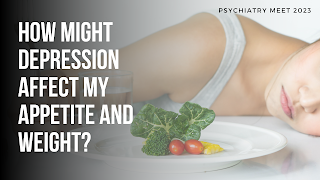How might depression affect my appetite and weight?
Appetite and weight
changes are common but variable diagnostic markers in major depressive
disorder: some depressed individuals manifest increased appetite, while others
lose their appetite. Many of the brain regions implicated in appetitive
responses to food have also been implicated in depression. Researchers know
that depression can lead to weight gain, and that weight gain can also
contribute to depression. Weight gain can happen when a person is depressed
because: They lose interest in activities and are less physically active. They
tend to eat a diet higher in fat due to poor food choices. People tend to feel
low in energy when they are depressed – this can mean that having to cook or
eat may feel like too much for them.
Anxiety triggers
emotional and psychological changes in your body to help you deal with the
pressure. These changes often affect the stomach and digestive tract and can
make you lose your appetite. If stress is the reason, your hunger usually
returns once you're feeling more relaxed. People can experience a loss of
appetite for a wide range of reasons. Some of these are short-term,
including colds, food poisoning,
other infections, or the side effects of medication. Others are to do
with long-term medical conditions, such as diabetes, cancer, or life-limiting
illnesses. Overeating or inactivity as a result of
depression can cause weight gain. Some people lose weight as part of their
depression. In turn, an improved appetite associated with improved mood may
result in increased weight. Adults generally tend to gain weight as they age,
regardless of the medications they take.
When you're
struggling with depression, your eating habits often suffer. Some people overeat and gain weight, turning
to food to lift their mood. Others find they're too exhausted to prepare
balanced meals or that they've lost their appetite Cortisol stimulates your fat and carbohydrate
metabolism, creating a surge of energy in your body. While this process is
essential for survival situations, it also increases your appetite.
Additionally, elevated cortisol levels can cause cravings for sweet, fatty and
salty foods.



Comments
Post a Comment